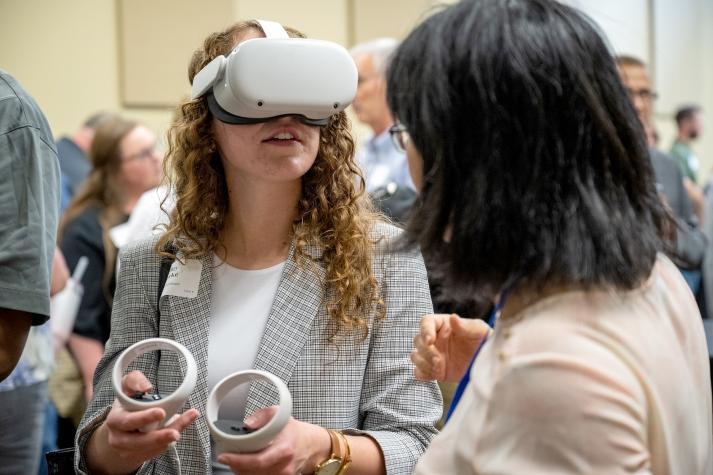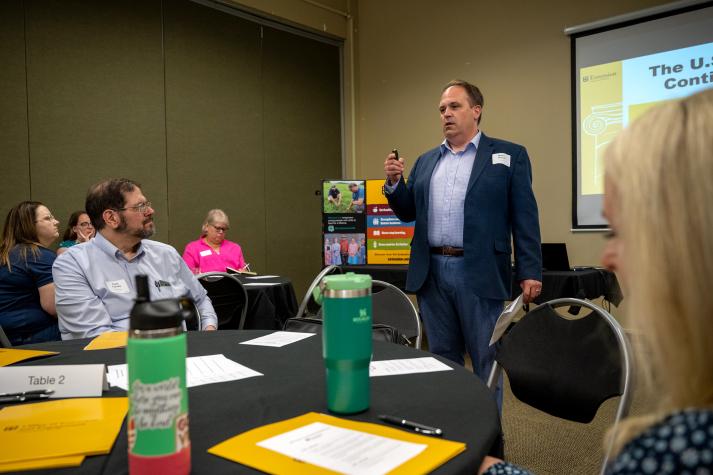Writer
Katherine ForanCOLUMBIA, Mo. – Missouri needs more workforce training opportunities to be competitive in attracting and retaining employees and growing economic investment, say state and educational leaders.
To help meet this need, the University of Missouri Career Accelerator provides noncredit offerings, including industry-driven online bootcamps, certifications and customized workforce trainings. A partnership between the MU Office of the Provost and MU Extension, the Career Accelerator was officially introduced at a May 18 event in Columbia.
The Career Accelerator was developed with support from a Missouri Department of Higher Education and Workforce Development MoExcels grant, said Sarah Traub, MU interim associate vice chancellor for extension and engagement.
“As the half-life of knowledge continues to shrink, we must stand ready to help our citizens and serve the workforce needs of our state,” said MU Provost Latha Ramchand. “The Career Accelerator is a bold new initiative that was developed thanks to support from the governor’s office via a MoExcels grant.”
The initiative is an outgrowth of MU’s participation in the Adult Learner Network, a consortium of private and public educational partners convened to address the state’s workforce development needs, and specifically to meet two goals by 2030:
- Increase the percentage of the state labor force having some kind of degree or certificate from its current 50.5% to 60%, with an additional focus on increasing educational attainment for Black, Hispanic and rural workers.
- Increase labor force participation from 63% to 70%, with an additional equity focus.
Missouri’s workforce has grown at an average rate of 0.69% over the last 15 years—slower than the U.S. average and that of several surrounding states, said Rob Russell, MU Extension business and community senior program director. “How do we get more people, and more people of prime working age, into the labor force, and how do we train our current workforce in new needed skills?”
According to Mark Bauer, special assistant with the Missouri Department of Higher Education and Workforce Development, the Career Accelerator does this by aligning worker skill sets with business practices, “making the MU Career Accelerator an important partner in supporting Missouri’s economy. The Missouri Department of Higher Education and Workforce Development is a committed partner towards these efforts.”
The Accelerator’s current offerings grew out of a needs assessment of central Missouri industries and businesses. An advisory board of business and industry leaders will meet quarterly to make sure courses and resources are responsive to the changing needs of employers and adult learners, said Sarah Rielley, senior coordinator for the MU Extension business and community program.
“Our people strategy is to align our people and culture with our long-term growth strategy,” said advisory board member Arturo Del Rio, vice president of human resources and chief people officer for American Outdoor Brands. “A key component of this alignment is workforce success. This partnership with the Career Accelerator provides knowledge and experience in building the right programs to accelerate talent readiness within American Outdoor brands.”
Self-paced online courses offer paths to noncredit certification in construction management, supply chain management and clinical engineering areas based on regional workforce needs. Shorter “bootcamps” include coding, digital technology and supervisory certification, Rielley said. Accelerator faculty and staff also work with individual businesses to design customized training and workforce development opportunities.
The online hub also provides a connection to MU’s noncredit continuing education offerings through Continuing Education for Health Professions, the Law Enforcement Training Institute, Fire and Rescue Training Institute, Veterinary Extension and the Missouri Training Institute.
The MU Career Accelerator is one initiative to emerge from the UM System Extension and Engagement Week 2020 focus on workforce development.
Learn more at www.mizzou.us/CareerAccelerator.
Contact:
Sarah Rielley, Senior Coordinator
University of Missouri Extension–Business and Community
573-882-0380, edwardssar@missouri.edu
Photos:
https://extension.missouri.edu/media/wysiwyg/Extensiondata/NewsAdmin/Photos/2023/20230525-ca-1.jpg
Riley Burke, workforce development associate with EquipmentShare, tests out a virtual reality recruitment game, developed by Mizzou Engineering faculty, at the May 18 MU Career Accelerator kickoff.
https://extension.missouri.edu/media/wysiwyg/Extensiondata/NewsAdmin/Photos/2023/20230525-ca-2.jpg
Missouri’s labor force growth lags that of many surrounding states and the U.S. as a whole. The MU Career Accelerator aims to grow workforce participation and educational attainment to help the state attract and retain business, says Rob Russell, MU Extension business and community senior program director.

